2009 was not as big of a year for Internet and information technology (“info-tech”) policy books as 2008 was, but there were still some notable titles released that offered interesting perspectives about the future of the Net and the impact the Digital Revolution is having on our lives, culture, and economy. So, like last year, I figured I would throw together my list of the 10 most important info-tech policy books of the year.
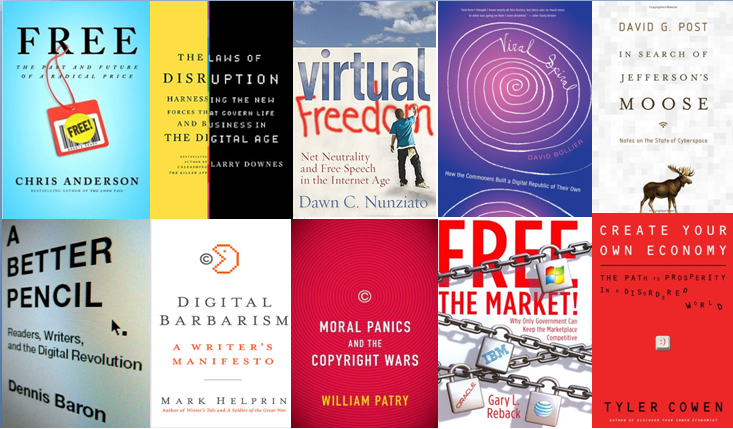 First, let me repeat a few of the same caveats and disclaimers that I set forth last year. What qualifies as an “important” info-tech policy book? Simply put, it’s a title that many people are currently discussing and that we will likely be referencing for many years to come. However, I want to be clear that merely because a book appears on my list it does not necessarily mean I agree with everything said in it. In fact, as was the case in previous years, I found much with which to disagree in my picks for the most important books of 2009 and I find that the cyber-libertarianism I subscribe to has very few fans out there.
First, let me repeat a few of the same caveats and disclaimers that I set forth last year. What qualifies as an “important” info-tech policy book? Simply put, it’s a title that many people are currently discussing and that we will likely be referencing for many years to come. However, I want to be clear that merely because a book appears on my list it does not necessarily mean I agree with everything said in it. In fact, as was the case in previous years, I found much with which to disagree in my picks for the most important books of 2009 and I find that the cyber-libertarianism I subscribe to has very few fans out there.
Another caveat: Narrowly-focused titles lose a few points on my list. For example, if a book deals mostly with privacy issues, copyright law, or antitrust policy, it does not exactly qualify as the same sort of “tech policy book” as other titles found on this list since it is a narrow exploration of just one set of issues with a bearing on technology policy.
With those caveats in mind, here are my choices for the Most Important Info-Tech Policy Books of 2009.
(1) Chris Anderson – Free: The Future of a Radical Price
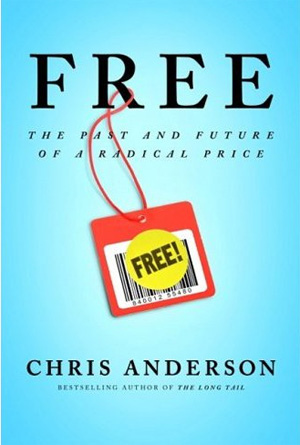 Chris Anderson’s 2006 book The Long Tail will be remembered as one of the most influential tech policy books of the decade. It changed the way we talk about the digital marketplace and it instantly garnered a huge audience outside of the nerdy world of Internet policy. While Free: The Future of a Radical Price will forever live in the shadow of The Long Tail, it too is an important book and in many ways it is a much better one.
Chris Anderson’s 2006 book The Long Tail will be remembered as one of the most influential tech policy books of the decade. It changed the way we talk about the digital marketplace and it instantly garnered a huge audience outside of the nerdy world of Internet policy. While Free: The Future of a Radical Price will forever live in the shadow of The Long Tail, it too is an important book and in many ways it is a much better one.
In The Long Tail, Anderson tried too hard to invent the latest business theory du jour, and in doing so he went much too far in proclaiming that, as the subtitle of the book argued, “the future of the business is selling less of more.” That’s just not true. While there’s certainly a lot more action in the long tail than ever before since it is so much more accessible, that does not mean the entire future of business lies in “selling less of more.” To the contrary, the fat head of the tail is just as profitable as ever.
Free certainly contains some of the flamboyance on display in The Long Tail, but Anderson has matured as a writer and is now far more willing to point out the limitations of his theories in a business sense. He does a splendid job in Free of creating a taxonomy of free-oriented business models to guide discussions about these issues. And he explains how “free” can be part of many different business models and strategies. His historical treatment of the issues is outstanding and includes many entertaining examples of how these “free” strategies have been used over time to offer innovative new goods and services.
The reason his book is important for Internet policy discussions is obvious: “free” is increasingly viewed as a threat to many existing companies, industry sectors, and traditional media business models. For example, battles about the future of journalism and search engine indexing of news sites are obviously tied up with battles over “free.” And, it goes without saying that the traditional entertainment industry business models are increasingly challenged by “free” as many struggle to adapt to the new realities of the online world, in which “free” (primarily advertising-supported and “freemium” models) seems to be the only model with any legs.
Much like my top pick for 2008 book of the year, Jonathan Zittrain’s The Future of the Net and How to Stop It, Chris Anderson’s Free is the most important information technology book of the year because it is the one we will still be talking about the most a decade from now. However, unlike Zittrain’s book and thesis, which I think will be largely discredited in another ten years, Anderson’s book will likely be viewed as an important and lasting contribution to the field.
(2) Larry Downes – The Laws of Disruption: Chaos and Control in Your Virtual Future
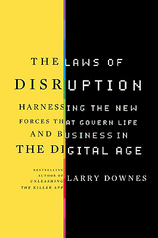 The Laws of Disruption is the closest thing you will find to a genuine cyber-libertarian manifesto these days. But Downes isn’t a rigid ideologue; his skepticism of government regulation of the high-tech economy is based more on practical considerations and the fundamental “law of disruption”: “technology changes exponentially, but social, economic, and legal systems change incrementally.” Downes says this law is “a simple but unavoidable principle of modern life” and that it will have profound implications for the way businesses, government, and culture evolve going forward. “As the gap between the old world and the new gets wider,” he argues, “conflicts between social, economic, political, and legal systems” will intensify and “nothing can stop the chaos that will follow.” In this sense, The Laws of Disruption reads like an addendum to one of Alvin Toffler’s old books on technology and futurism in that Downes is essentially walking us through the practical consequences of life in a “post-industrial society.”
The Laws of Disruption is the closest thing you will find to a genuine cyber-libertarian manifesto these days. But Downes isn’t a rigid ideologue; his skepticism of government regulation of the high-tech economy is based more on practical considerations and the fundamental “law of disruption”: “technology changes exponentially, but social, economic, and legal systems change incrementally.” Downes says this law is “a simple but unavoidable principle of modern life” and that it will have profound implications for the way businesses, government, and culture evolve going forward. “As the gap between the old world and the new gets wider,” he argues, “conflicts between social, economic, political, and legal systems” will intensify and “nothing can stop the chaos that will follow.” In this sense, The Laws of Disruption reads like an addendum to one of Alvin Toffler’s old books on technology and futurism in that Downes is essentially walking us through the practical consequences of life in a “post-industrial society.”
In terms of what it all means for public policy, Downes doesn’t so much fear legal and regulatory over-reach the way many cyber-libertarians do. Rather, he thinks most regulatory schemes just won’t work. In essence, he is a technological fatalist or consequentialist: Progress happens whether we like it or not, so get used to it! Thus, the “laws of disruption” he articulates serve primarily as “Just-Don’t-Bother” warnings to over-eager government meddlers. “The best way to regulate innovation is to leave it alone,” he counsels.
In terms of structure, The Laws of Disruption resembles Blown to Bits: Your Life, Liberty, and Happiness After the Digital Explosion by Abelson, Ledeen, and Lewis, (which I reviewed here last year and named to my 2008 list). Both books survey a vast swath of territory — privacy, copyright, security, etc — and each chapter offers unique perspectives on each debate. In that sense, the book is useful to readers if for no other reason than you get a taste for how a wide variety of issues are playing out. Downes also owes much to Clayton M. Christensen and his seminal 1997 book The Innovator’s Dilemma: When New Technologies Cause Great Firms to Fail. Like that book, The Laws of Disruption is a business book with a strong policy hook. That is, both books focus on advice-dishing for companies and innovators looking to “stay ahead of the curve” in the midst of relentless, gut-wrenching technological change, but the books also include important lessons regarding the public policies that should govern high-tech sectors.
I highly recommended The Laws of Disruption and found it to be the most enjoyable of all the books I read this year.
(3) Dawn C. Nunziato – Virtual Freedom: Net Neutrality and Free Speech in the Internet Age
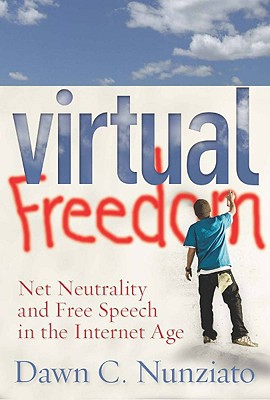 Dawn Nunziato is the perfect foil for Larry Downes. Her book is a manifesto for cyber-collectivism and “media access theory.” (For those unfamiliar with media access theory, see my old essay: “Your Soapbox is My Soapbox! Thoughts on the Media Access Movement in General and the Media & Democracy Coalition’s ‘Bill of Media Rights’ in Particular.”) She attempts to bring media access theory up to date by taking the ideas made famous by Jerome Barron, Owen Fiss, Cass Sunstein, and others, and applying them to the Internet and digital technologies. Like those earlier legal thinkers, she argues for “an affirmative conception” of the First Amendment that would allow government to use the First Amendment to “facilitate the conditions necessary for democratic self-government” (whatever that means). Net neutrality regulation becomes one of many ways she would put this theory into action. Importantly, she would not stop with ISPs. She makes the case for extending the entire regulatory regime to Google and search platforms. Welcome to the Brave New World of the the FCC as the Federal Search Commission or Federal Cloud Commission!
Dawn Nunziato is the perfect foil for Larry Downes. Her book is a manifesto for cyber-collectivism and “media access theory.” (For those unfamiliar with media access theory, see my old essay: “Your Soapbox is My Soapbox! Thoughts on the Media Access Movement in General and the Media & Democracy Coalition’s ‘Bill of Media Rights’ in Particular.”) She attempts to bring media access theory up to date by taking the ideas made famous by Jerome Barron, Owen Fiss, Cass Sunstein, and others, and applying them to the Internet and digital technologies. Like those earlier legal thinkers, she argues for “an affirmative conception” of the First Amendment that would allow government to use the First Amendment to “facilitate the conditions necessary for democratic self-government” (whatever that means). Net neutrality regulation becomes one of many ways she would put this theory into action. Importantly, she would not stop with ISPs. She makes the case for extending the entire regulatory regime to Google and search platforms. Welcome to the Brave New World of the the FCC as the Federal Search Commission or Federal Cloud Commission!
Her attempt to cast Net neutrality as the Internet’s First Amendment is a grotesque contortion of the real First Amendment, and a complete betrayal of the Founder’s original intentions. As I made clear in my recent essay on “Net Neutrality Regulation & the First Amendment,” the Internet’s First Amendment is the First Amendment, not some new, top-down, heavy-handed regulatory regime that puts the Federal Communications Commission in control of the Digital Economy. Her conception of the First Amendment would convert it from a shield against government control into a sword that the government could use as it wished. It would mean that “Congress shall make no law…” would suddenly be replaced by “Congress shall make whatever law it wants” so long as it serves some amorphous “public interest.” Can you say “tyranny of the majority”?
Regardless, event though I find her views to be morally repugnant and the antithesis of true digital freedom, Nunziato’s book is a concise articulation of that vision and it deserves everyone’s attention. It serves as a blueprint for where the Net neutrality wars are taking us.
(4) David Bollier – Viral Spiral: How the Commoners Built a Digital Republic of Their Own
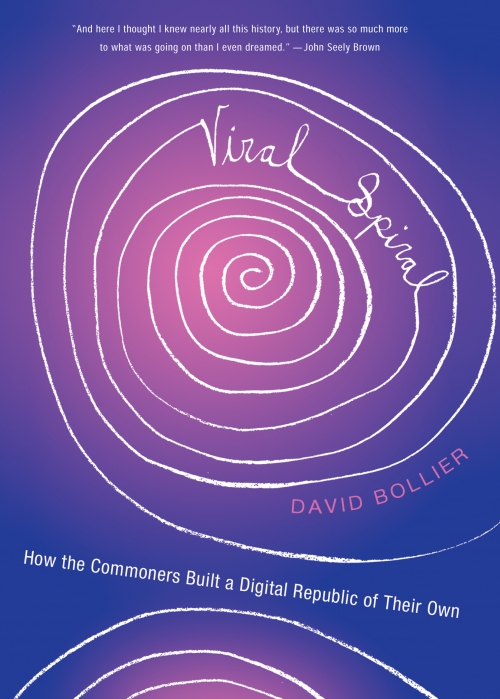 David Bollier’s Viral Spiral is the first major history of the “digital commons” / “free culture” movement, and despite my many person disagreements with him and this movement, it is an excellent treatment of the topic. Bollier surveys this growing intellectual movement from its early open source days to the rise of the Creative Commons and on into the present. The cast of characters in this drama will be well-known to anyone involved in modern tech policy debates: Richard Stallman, Lawrence Lessig, Jonathan Zittrain, Yochai Benkler, et al.
David Bollier’s Viral Spiral is the first major history of the “digital commons” / “free culture” movement, and despite my many person disagreements with him and this movement, it is an excellent treatment of the topic. Bollier surveys this growing intellectual movement from its early open source days to the rise of the Creative Commons and on into the present. The cast of characters in this drama will be well-known to anyone involved in modern tech policy debates: Richard Stallman, Lawrence Lessig, Jonathan Zittrain, Yochai Benkler, et al.
There is absolutely no doubt that this intellectual movement is winning the war of ideas in cyberlaw front today, as I noted in a recent debate with Lessig and Zittrain over at Cato Unbound. As a cyber-libertarian, I find myself occasionally at odds with these guys and this movement on a variety of policy issues, but that didn’t stop me from enjoying David Bollier’s treatment of this movement and these issues.
(5) David Post – In Search of Jefferson’s Moose: Notes on the State of Cyberspace
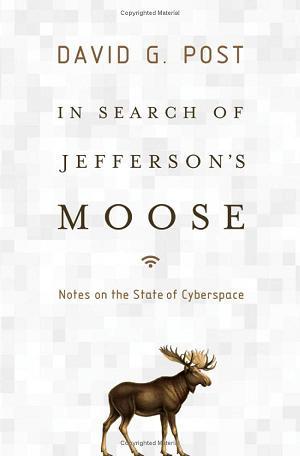 David Post is one of the early intellectual giants in the field of cyberlaw. Back in the days when most of us were still just trying to get our 14.4 modems to work properly to get on Al Gore’s “Information Highway,” David Post was writing essays and law review articles that were a decade ahead of their time. In particular, his work on Internet governance and jurisdictional matters was path-breaking, and much of it is updated and extended in Jefferson’s Moose.
David Post is one of the early intellectual giants in the field of cyberlaw. Back in the days when most of us were still just trying to get our 14.4 modems to work properly to get on Al Gore’s “Information Highway,” David Post was writing essays and law review articles that were a decade ahead of their time. In particular, his work on Internet governance and jurisdictional matters was path-breaking, and much of it is updated and extended in Jefferson’s Moose.
I must admit, however, that I was hoping for a bit more from David in this book. Beyond just being a first-rate intellectual in this space, he is also one of the few remaining defenders of “Internet exceptionalism,” and he has genuine cyber-libertarian leanings. After waiting almost 10 years for David to wrap this thing up after he first told me about it back around 2000, I was thinking he might come up with the sort of cyber-libertarian manifesto I’ve always hoped he would write. Although he fell a bit short in that regard, it doesn’t mean it’s not a good book. It is. You will enjoy it no matter what cyber-philosophy you subscribe to.
Read my entire review of Jefferson’s Moose here.
(6) Dennis Baron – A Better Pencil: Readers, Writers, and the Digital Revolution
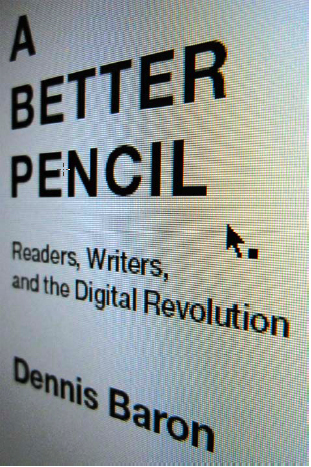 Baron’s A Better Pencil is a splendid history of techno-pessimism and the endless battles about the impact of new technologies on life and learning, something I have written about here before in my essays on “Internet optimists vs. pessimists” (See: 1, 2, 3). Baron notes that almost as soon as people learned to put chisel to stone and then quill to paper, a great debate began about the impact of new communications technology on culture and education. And that debate rages on today with a new generation of optimists and skeptics battling over the impact that computing, the Internet, and digital technologies have on our lives and on how we learn about the world.
Baron’s A Better Pencil is a splendid history of techno-pessimism and the endless battles about the impact of new technologies on life and learning, something I have written about here before in my essays on “Internet optimists vs. pessimists” (See: 1, 2, 3). Baron notes that almost as soon as people learned to put chisel to stone and then quill to paper, a great debate began about the impact of new communications technology on culture and education. And that debate rages on today with a new generation of optimists and skeptics battling over the impact that computing, the Internet, and digital technologies have on our lives and on how we learn about the world.
Baron walks us through a litany of historical examples—the printing press, the telegraph, telephones, typewriters, pocket calculators, personal computers, word processors, webpages, blogs, social-networking sites, and more—and identifies the usual pattern: we greet each new technology with deep distrust and dire warnings, but in time we adapt to the new realities. Indeed, as a species, we have an unparalleled ability to learn new ways of doing things. We don’t always like technological change, and often we deeply resent or fear it, but in the end, we learn to live with it and eventually to embrace it. With the rise of the Internet and digital technologies, we see this pattern unfolding once again. But Baron counsels patience and understanding instead of the sort f hysteria and backlash we see from the likes of Andrew Keen, Lee Siegel and others. It’s a refreshing and uplifting perspective.
Highly recommended. See my complete review of Baron’s A Better Pencil over at the City Journal website.
(7) Mark Helprin – Digital Barbarism: A Writer’s Manifesto
 No book has been more disappointing to me in recent memory than Mark Helprin’s Digital Barbarism. As someone who still finds a lot to defend in copyright law, I was excited when I learned that one of America’s most gifted authors–and the author of my favorite literary work of the late 20th century (A Soldier of the Great War)–was taking a crack defending copyright in a short manifesto.
No book has been more disappointing to me in recent memory than Mark Helprin’s Digital Barbarism. As someone who still finds a lot to defend in copyright law, I was excited when I learned that one of America’s most gifted authors–and the author of my favorite literary work of the late 20th century (A Soldier of the Great War)–was taking a crack defending copyright in a short manifesto.
Alas, as I argued in my review of the book for National Review, while Helprin occasionally rises to great heights in his defense of copyright, he too often sinks to lamentable lows–by resorting to the same unbecoming rhetorical tactics used by the “cyber-mob” he seeks to condemn. Indeed, his book is filled with gratuitous vitriol and neo-Luddite ramblings about the Internet and Information Age that severely detract from his defense of copyright. Channeling the ghost of the late social critic Neil Postman, Helprin’s critique of copyright skeptics quickly turns into an all-out assault on modern digital culture and cyberspace. He argues that we are witnessing “the decline of culture,” the “mechanization of the soul,” our “intellectual and spiritual destruction,” and the rise of a movement of “wacked-out muppets led by little professors in glasses” that “threatens in a decade or two to dissolve the accomplishments of millennia, reordering the ways in which we think, write, and communicate.” And it just gets worse from there. Much like recent rants by Andrew Keen and Lee Siegel, Helprin speaks repeatedly about the “surrender of human nature” to “the machine revolution” and the corresponding need to “control the machine.”
How a man who has penned some of the most beautiful prose in modern times could craft an off-the-rails screed of this magnitude remains incomprehensible to me. What’s worse is that he set back the cause of defending what’s best about copyright in the process. Luckily for Helprin, there’s plenty of hysteria on the other side, as the next book on my list makes clear.
(8) William Patry – Moral Panics and the Copyright Wars
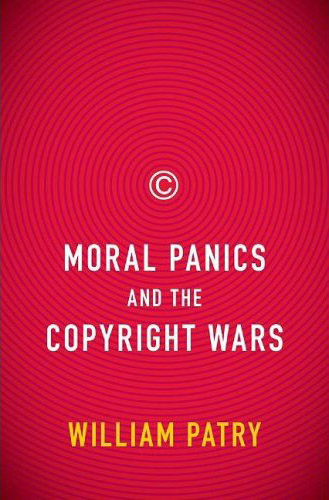 Bill Patry is an angry man. He is the anti-Helprin. The vitriol that Helprin directs against the copyright-haters is reversed in this screed and turned against not just copyright holders and content creators, but against the entire capitalist system. Patry, who is the author of a multi-volume treatise on copyright law, has done the intellectual equivalent of “going postal” within his own intellectual community. He has turned his intellectual guns on anyone and everyone who has ever had a kind word to say about copyright. He cannot find one nice thing to say about copyright or anyone who defends copyright in this book. Not one.
Bill Patry is an angry man. He is the anti-Helprin. The vitriol that Helprin directs against the copyright-haters is reversed in this screed and turned against not just copyright holders and content creators, but against the entire capitalist system. Patry, who is the author of a multi-volume treatise on copyright law, has done the intellectual equivalent of “going postal” within his own intellectual community. He has turned his intellectual guns on anyone and everyone who has ever had a kind word to say about copyright. He cannot find one nice thing to say about copyright or anyone who defends copyright in this book. Not one.
What’s most ironic about the book is that Patry seems utterly oblivious to the fact that in the process of critiquing the inflammatory rhetoric and “misuse of language” occasionally emanating from some copyright defenders, he goes completely over the top himself and engages in even more egregious rhetorical flourishes. Choice gems from the book include: “digital guillotines,” copyright as “cancer,” “copyright dwarves,” Maoism, the “sins” of copyright, “socialism for the wealthy,” and a comparison of the DMCA to “Mussolini’s Fascist Italy.” Apparently when it comes to the “misuse of language,” Patry believes that two wrongs make a right.
And then there is his mind-boggling conclusion that: “I cannot think of a single significant innovation in either the creation or distribution of works of authorship that owes its origins to the copyright industries.” Apparently, every great book, every great movie, every great video game, and ever great musical composition of the past century was done solely for the love of it all. Copyright had apparently had absolutely nothing to do with it according to Patry’s logic. That is just an astonishingly naive notion, in my opinion. Apparently this man’s hatred for copyright-related industries is so intense that it has blinded him to any potentially positive effects of copyright law. If nothing else, it would have been nice to see Mr. Patry address how it is that America is the world’s leading creator and exporter of creative arts. Certainly copyright law must have had something to do with that!
Chapter 5 of his book makes it clear that Patry’s critique of copyright is actually rooted in a much deeper suspicion about capitalism itself. He speaks of “the myth of economic freedom” and claims that “free market fundamentalism… destroyed much of the world’s economies.” He then launches into a neo-Marxist critique of property rights more generally, treating property as a zero-sum game of winners and losers. At times it all begins to sound like a rant from an old Herbert Marcuse book with questions like: “why are the interests of one social group favored over another?” and “What social objective is being furthered by the decision to privilege one group over another?” And there’s all sorts of talk about “regulation in the public interest,” which I have critique as a meaningless non-standard here many times before.
In the end, Patry’s book will–along with Helprin’s–long be remember as marking the nadir in the “copyright wars;” a moment when grown men of great intelligence decided to trade in their integrity for the opportunity to engage in below-the-belt rhetorical cheap shots that would typically be reserved for college student debating politics over beers and shots at two in the morning. They should both be ashamed of themselves.
(9) Gary Reback – Free the Market! Why Only Government Can Keep the Marketplace Competitive
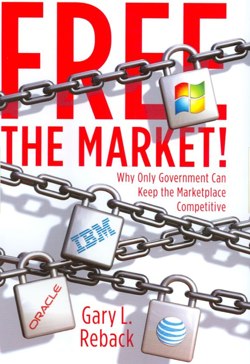 Gary Reback’s over-the-top ode to antitrust as the great savior of capitalism reads like an extended love letter. As I noted in my lengthy critique of his book, his fairy tale narrative of antitrust as the savior of capitalism is hopelessly one-sided, and his recommendations to expand antitrust enforcement wouldn’t “Free the Market” as he argues in his book’s shameful title, but would instead wrap it in regulatory chains.
Gary Reback’s over-the-top ode to antitrust as the great savior of capitalism reads like an extended love letter. As I noted in my lengthy critique of his book, his fairy tale narrative of antitrust as the savior of capitalism is hopelessly one-sided, and his recommendations to expand antitrust enforcement wouldn’t “Free the Market” as he argues in his book’s shameful title, but would instead wrap it in regulatory chains.
He repeatedly insults the intelligence of the reader by claiming antitrust is supposedly not a form of economic regulation and that is can only have beneficial effects. He wants antitrust officials to intervene early and often in high-tech markets to guide markets to a supposedly better place. Reback considers just about everything “the Chicago School” taught us to be antitrust apostasy and he would like to erase four decades worth of economic literature and evidence that suggests antitrust law is a form of economic regulation and does have unintended consequences that often hurt consumer welfare. Even if you are not an inherent antitrust skeptic like me, I think most people would hope for a better treatment of the other side of this story.
Read my lengthy review of Reback’s Strangle Free the Market here.
(10) tie – Tyler Cowen – Create Your Own Economy: The Path to Prosperity in a Disordered World and John Freeman – The Tyranny of E-Mail: The Four-Thousand-Year Journey to Your Inbox
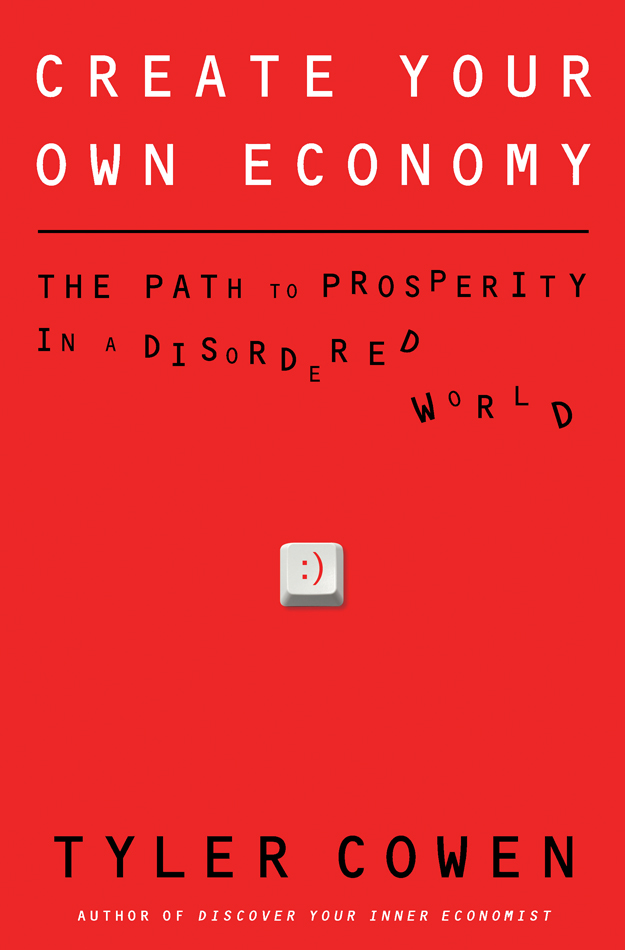 OK, so I just couldn’t figure out which of these two to cut from the list so I took the easy way out by having them tie for the last slot! In this case, however, there’s another reason it makes sense for both of them to round out the list: Both Freeman and Cowen explore how humans are coping with information overload–albeit from two very different perspectives.
OK, so I just couldn’t figure out which of these two to cut from the list so I took the easy way out by having them tie for the last slot! In this case, however, there’s another reason it makes sense for both of them to round out the list: Both Freeman and Cowen explore how humans are coping with information overload–albeit from two very different perspectives.
As I noted in my lengthy essay on the topic earlier this year, Cowen is an unrepentant optimist. He believes humans have the ability to adapt to new technological realities and a world of information abundance. In fact, Cowen argues, new tools and information gathering and processing technologies actually “lengthens our attention spans in another way, namely by allowing greater specialization of knowledge.”
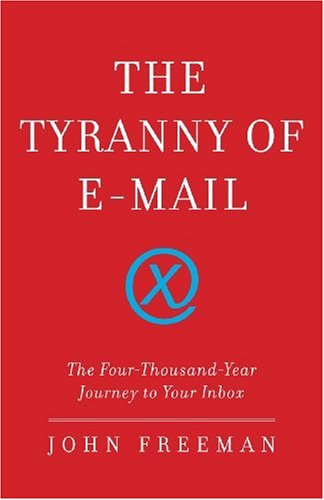 John Freeman, by contrast, wants us all to take a high-tech time out. Like other Internet skeptics, he is worried that cyberspace and digital technologies are reshaping humanity–and not for the better. “If we are to step off this hurtling machine, we must reassert principles that have been lost in the blur,” he argues. “It is time to launch a manifesto for a slow communication movement, a push back against the machines and the forces that encourage us to remain connected to them.”
John Freeman, by contrast, wants us all to take a high-tech time out. Like other Internet skeptics, he is worried that cyberspace and digital technologies are reshaping humanity–and not for the better. “If we are to step off this hurtling machine, we must reassert principles that have been lost in the blur,” he argues. “It is time to launch a manifesto for a slow communication movement, a push back against the machines and the forces that encourage us to remain connected to them.”
Unlike most other Internet pessimists, however, Freeman’s tone is more measured and his recommendations more reasonable. Of course, it helps that he is magical wordsmith. Even if you find yourself disagreeing with many of his ultimate conclusions–as I did–you should read The Tyranny of E-Mail for a lesson in how to construct an argument and to appreciate the gift of fine writing. It’s easily the best tract by any Net skeptic since Nick Carr’s The Big Switch, and a much better one in many ways. It will force you to ask tough questions about the impact of the Information Age on you and the world around you. Nonetheless, I remain an unrepentant techno-optimist (albeit a pragmatic one)!
_______________
Honorable Mentions: Here are a couple of other books that I couldn’t fit on my list but that you might want to also consider adding to your bookshelf:
- Manuel Castells – Communication Power
- James Boyle – The Public Domain: Enclosing the Commons of the Mind
- Randall Stross – Planet Google: One Company’s Audacious Plan to Organize Everything We Know [my review]
- Ken Auletta – Googled: The End of the World As We Know It [my review]
- Scott Rosenberg- Say Everything: How Blogging Began, What It’s Becoming, and Why It Matters
- John W. Dozier Jr. and Sue Scheff – Google Bomb
Please let me know what titles might be missing from this list and which books you think are the best of the year.
And speaking of bookshelves, here’s my Shelfari digital bookshelf in case anyone is interested. If you hadn’t figured it out yet, I am a bit of book nerd! My life is spent swimming through oceans of paper. My friends often ask me, “How can you spend so much time reading?” My question back to them is: “How can you not?”

 The Technology Liberation Front is the tech policy blog dedicated to keeping politicians' hands off the 'net and everything else related to technology.
The Technology Liberation Front is the tech policy blog dedicated to keeping politicians' hands off the 'net and everything else related to technology.